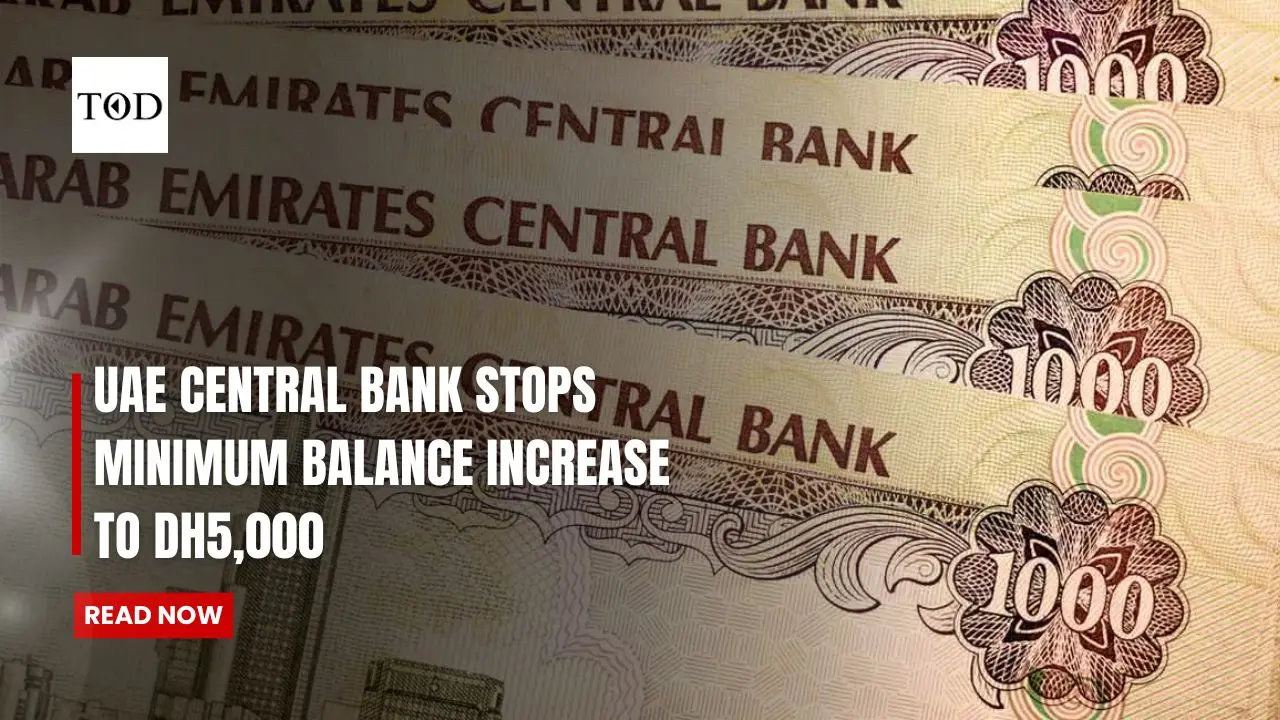UAE, 28th May, 2025: As part of an important decision, the UAE Central Bank has instructed all banks working in the country to postpone the scheme to implement a minimum balance of DH5,000 at the moment. This decision has been taken because recently, there were reports of many banks increasing the minimum balance to DH5,000, which increased concern among common consumers.
The move aims to deeply evaluate its potential effects on consumers so that no such change is applicable in the future without proper review. This initiative of the UAE Central Bank is considered a positive indication towards giving relief to common people and small account holders. It is also clear from this that transparency and consumer interests are being given priority in banking policies.
Background of the Proposed Increase
Banks were preparing for the minimum balance plan to be increased from 1 June 2025. Many major banks of the country have announced that they are going to increase the minimum balance limit to DH5,000 as of 1 June 2025. Under this new policy, customers who will not be able to maintain this minimum amount in their account would have to pay a fee from DH25 to D105 every month. This fee depends on the type of the customer’s account and its relationship with banking services.

However, some special customers were also to be exempted from this fee, provided they fulfill one of the standards below:
- Transfer of at least DH15,000 salary account every month
- Total balance in the customer’s bank account remains DH20,000 or more
- The Customer has an active credit card, overdraft, or bank loan
At the same time, customers whose monthly income is less than DH5,000 and who do not fulfill any conditions above would have to face this new fee. This would especially provide an additional financial burden on low-income residents and small businesses.
Public Reaction and UAE Central Bank’s Response
After the announcement of a possible increase, there was widespread criticism from the general public. Many account holders expressed concern that this change could put an additional financial burden on low-income residents and small businesses. Keeping this response in mind, the UAE Central Bank has issued a circular and directed all banks to stop the plan to increase the minimum balance to DH5,000.
Clearly stated in the circular:
“Keeping in mind the reports that some banks are planning to increase the minimum balance to DH5,000, the UAE Central Bank has decided that the impact of this increase will be studied. Therefore, all banks are instructed not to postpone this increase at the moment and are not to implement it until the next notice.”

This decision is considered an important step towards protecting the interests of consumers and ensuring policy transparency.
Implications for Bank Customers
The ban on the plan to increase the minimum balance has brought great relief to the customers who could have been affected by this change. Now, customers can maintain the existing minimum balance of DH3,000 as before without any additional fee.
However, it is important that all account holders keep an eye on any new information coming from their banks or the UAE Central Bank so that they can be ready for any future changes. This step is especially relaxing for those whose monthly income is limited or who run small businesses.
Financial Sector Overview
Despite the proposed changes, the UAE’s banking sector remains very strong. According to the latest data, where the bank deposits were DH2.840 trillion at the end of January 2025, they increased to DH2.874 trillion by the end of February 2025, i.e., 1.2%.

The main reason for this growth is an increase of 0.8% in Resident Deposits and 5.1% in Non-Resident Deposits. This clearly shows that people’s trust in the banking sector remains, even if there is confusion about some policies.
The UAE Central Bank’s suspension of increasing the minimum balance of DH5,000 shows its commitment to financial stability and its sensitivity to public concerns. This step shows that the bank not only believes in maintaining economic strength but also takes full care of the convenience and interests of the customers.
Customers are requested to pay special attention to the information and updates received from their respective banks and the UAE central bank so that they can be fully informed before any upcoming changes. Such decisions further strengthen the reliability of customers’ trust and the financial system, which are extremely important for the prosperity and economic stability of the country. This step of the UAE central bank proves to be an example of a responsible and customer-focused banking system.
Read More: Abu Dhabi GDP Projected to Rise Consistently Through 2028, Driven by Non-Oil Sectors














